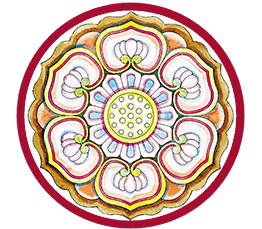Buddhism Q&A (1)
By By Householder Fo'en
Q1: Most Chinese people are aware of Buddhism. It is known as one of the three major religions in the world, together with Christianity and Islam. Is that correct?
A: Generally speaking, yes. Specifically, Buddhism is the teachings given by Shakyamuni Buddha, based on his realistic understanding of life and the universe. The sutras were spoken by the Buddha himself, which differ from scriptures of other religions recorded by disciples according to instructions from God or other deities.
Q2: Is the Buddha a deity?
A: The Buddha is not a deity. The Buddha is the Awakened One, who has attained full enlightenment regarding the truth about life and the universe.
Q3: Who is greater, Buddha or God?
A: According to the Dharma (teachings of Buddhism), all living beings have Buddha-nature equal to that of the Buddha. God is one of those living beings. So the question of who is greater does not exist.
Q4: Are Shakyamuni Buddha and Tathagata Buddha (Rulaifo) in the classic novel, Journey to the West, the same person?
A: "Tathagata" and "Buddha" have the same meaning. For example, Shakyamuni Buddha can be called Shakyamuni Tathagata, and Amitabha Buddha can be called Amitabha Tathagata. "Tathagata Buddha," however, is not correct. There is no such Buddha called "Rulai."
Q5: I see. I thought Rulaifo, Shakyamuni Buddha and Amitabha Buddha were the same.
A: Shakyamuni Buddha is the founder of Buddhism in our world. Amitabha Buddha presides over the Western Land of Bliss. In numerous sutras, Shakyamuni Buddha urges us to recite the name of Amitabha Buddha.
Characteristics
- Recitation of Amitabha’s name, relying on his Fundamental Vow (the 18th)
- Rebirth of ordinary beings in the Pure Land’s Realm of Rewards
- Rebirth assured in the present lifetime
- Non-retrogression achieved in this lifetime

The 18th Vow of Amitabha Buddha
If, when I achieve Buddhahood, sentient beings of the ten directions who sincerely and joyfully entrust themselves to me, wish to be reborn in my land and recite my name, even ten times, should fail to be born there, may I not attain perfect enlightenment. Excepted are those who commit the five gravest transgressions or slander the correct Dharma.
Guiding Principles
Faith in, and acceptance of, Amitabha’s deliverance
Single-minded recitation of Amitabha’s name
Aspiration to rebirth in Amitabha’s Pure Land
Comprehensive deliverance of all sentient beings
